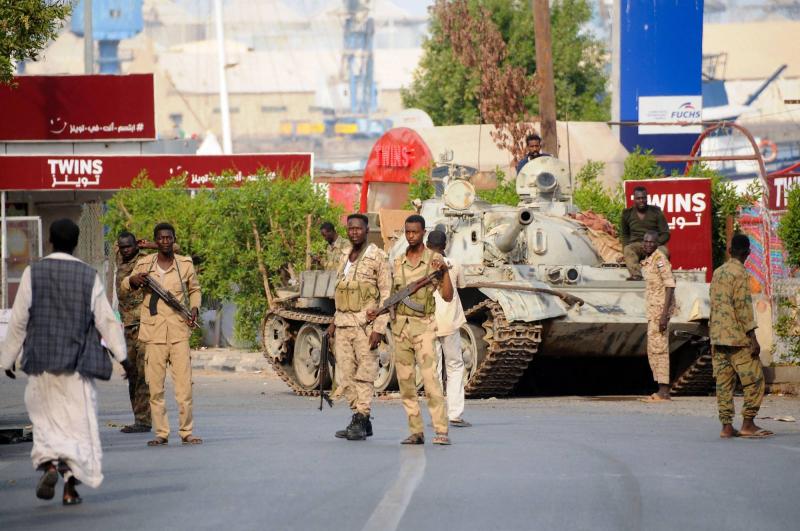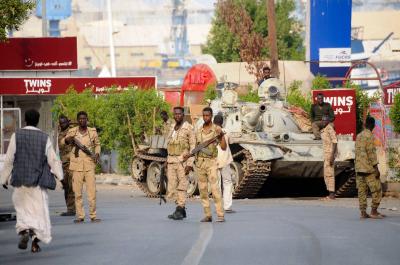The Sudanese Army and Rapid Support Forces continue their efforts to assist civilians facing the threat of the coronavirus amid ongoing fighting in the country.
Clashes in Sudan renewed late Tuesday, despite both warring parties announcing their commitment to a ceasefire. A UN envoy indicated that "the truce is holding in some areas, but there are no signs that either side is willing to negotiate seriously." Ismail Awad Allah, the governor of Al-Jazeera state in southeastern Sudan, declared a month-long state of emergency in the region. Both the Sudanese Army and the Rapid Support Forces agreed to a 72-hour ceasefire starting Tuesday after negotiations mediated by the United States and Saudi Arabia. However, reports surfaced of gunfire and explosions in the city of Omdurman, across the Nile from the capital Khartoum, where the military used drones to target Rapid Support Forces positions. The army also employed drones in attempts to drive the Rapid Support fighters away from a refinery in Bahri, the third city located at the confluence of the Blue and White Nile rivers.
The Sudanese Interior Ministry announced that "the Rapid Support Forces stormed 5 prisons and freed inmates from April 21 to 24," adding that "a force from the Rapid Support stormed Kober Prison, resulting in the death and injury of several prison management personnel and managed to free all inmates."
**Second American Casualty**
On Wednesday, the White House reported that a second American had died in Sudan and that the United States is providing assistance to a small number of Americans wishing to leave the country amid the ongoing clashes, although the violence has seemingly diminished significantly. John Kirby, a spokesperson for the White House National Security Council, told reporters that President Joe Biden's administration continues to work with both sides of the conflict to solidify the ceasefire to allow for more humanitarian aid to enter. He urged both military factions to adhere to the ceasefire and extend it, adding, "Violence levels... seem to overall have decreased significantly." Kirby stated, "The levels have decreased, but we want to see them at zero."
**Health Situation**
World Health Organization Director-General Tedros Adhanom Ghebreyesus stated that the organization expects more deaths in Sudan due to the outbreak of diseases and a lack of essential services amid intense fighting, noting that only 16% of health facilities in the country are operational. He mentioned, "The WHO expects more deaths because of the outbreak of diseases, food and water shortages, and the disruption of essential health services, including vaccinations." Air and artillery strikes have resulted in at least 459 fatalities and over 4,000 injuries, and have destroyed hospitals while limiting the distribution of food supplies in a nation where one-third of its 46 million population already relies on humanitarian aid. Foreigners fleeing from Khartoum described bodies scattered in the streets, burning buildings, residential areas turned into battlefields, and young people roaming with large knives.
**Turks Arrive in Istanbul**
Footage from Reuters showed that the first group of Turkish citizens evacuated from Sudan returned to Turkey on Wednesday, with more than 100 people arriving at Istanbul Airport.
**Germany: Evacuation Mission Complete**
The German Ministry of Defense announced on Twitter the completion of the evacuation mission from Sudan, stating that over 700 people, including about 200 German citizens, have been transported out of the country.
**China: Working to Evacuate About 800 People**
The Chinese Foreign Ministry stated it is working to "transport and evacuate about 800 Chinese individuals from Sudan," adding that "over 300 people have been evacuated to neighboring countries by land."
**Britain: Evacuation of Between 200 and 300 People**
A spokesperson for British Prime Minister Rishi Sunak announced that Britain has evacuated 391 people from Sudan by air and hopes to complete eight evacuation flights by the end of Wednesday, with the first rescued citizens arriving at Stansted Airport in London.
On Tuesday, the UN special envoy to Sudan, Volker Perthes, told the UN Security Council, "The ceasefire seems to be holding in some areas so far," while noting that "both sides do not appear ready to negotiate seriously, indicating that each believes it can achieve a military victory over the other." He emphasized that "these are miscalculations," confirming that "Khartoum Airport is back in operation, but the runway has been damaged."
Since the outbreak of war between the army and the Rapid Support Forces on April 15, the RSF has taken to residential neighborhoods, with the army trying to target them from the air. The war has disrupted Sudan's transition to democratic civilian rule. The conflict has turned residential areas into battlefields. Airstrikes and shelling have resulted in at least 459 deaths and wounded over 4,000, as well as the destruction of hospitals and the reduction of food distribution in a country where one-third of the population relies on aid.
A spokesperson for the Al-Roumi Medical Center in Omdurman reported that "a shell hit the hospital yesterday, causing injuries to 13 people."
**Fears of Bashir's Return**
The army has stoked these fears by confirming the transfer of Bashir (79 years old) from Kober Prison in Khartoum to Aliya Military Hospital along with at least five other officials from his former regime, just before the onset of fighting on April 15.
In another sign of deteriorating security, former minister Ahmed Haroun, wanted by the International Criminal Court for war crimes and crimes against humanity in Darfur, confirmed that he and other officials were allowed to leave Kober Prison. Two sources at a military hospital in the Sudanese capital reported that "Bashir was transferred from Kober Prison to the hospital before the outbreak of intense fighting on April 15." The ICC in The Hague has charged Bashir with genocide, and Haroun has been accused of organizing militias to attack civilians in Darfur in 2003 and 2004. The ICC declined to comment on the transfer of Bashir, Haroun, and Hussein from the prison.
The Forces of Freedom and Change - Central Council asserted that "Ahmed Haroun's statement is evidence that the ousted regime is behind the war in Sudan," pointing out that "the release of leaders from the ousted regime from prison means an escalation of the war."
**Biological Risks**
Additionally, the World Health Organization reported that "one party to the conflict has taken control of a government health facility in Khartoum," expressing concerns about "potential biological risks due to measles and cholera pathogens present in hospital stores."
The exodus of embassy staff and relief organizations from Sudan has raised fears for civilians unable to leave the country, as the fragile truce lasting three days is set to expire on Thursday. A White House spokesperson stated that "President Joe Biden's National Security team continues to engage with the warring military leaders in Sudan to work towards ending the fighting and providing humanitarian support."
The clashes have paralyzed hospitals and other essential facilities, forcing many people to stay in their homes amid shortages of food and water. With corpses lying in the streets, the organization Médecins Sans Frontières noted that it has been unable to deliver new supplies to Sudan. The UN Office for the Coordination of Humanitarian Affairs affirmed that "the shortage of food, water, medicine, and fuel has become extremely severe, with rising prices for goods, prompting the office to reduce its activities for safety reasons." The UN Refugee Agency has predicted that "hundreds of thousands may flee to neighboring countries."
**"Why has the world abandoned us?"**
As foreign governments rush to evacuate their citizens from Sudan, those who have nowhere else to flee feel the world has abandoned them. Somaya Yaseen (27 years old) asked, "Why has the world abandoned us in times of war?" accusing foreign powers of selfishness. Since the outbreak of clashes, tens of thousands of people have fled to Chad, Egypt, Ethiopia, and South Sudan. As civilians leave Khartoum in cars and buses, the streets of the capital have become nearly empty, with signs of daily life dwindling as those remaining in the city stay inside their homes while armed individuals roam outside.




